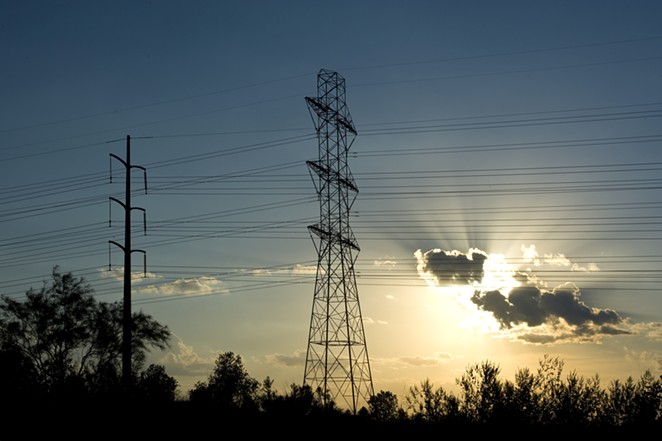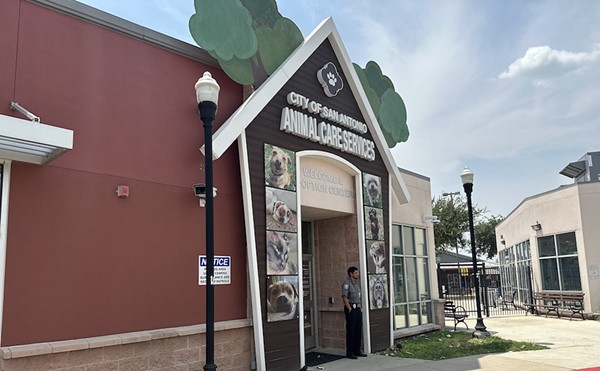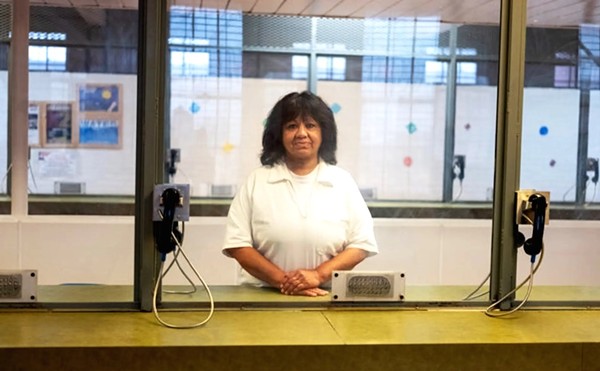Reforming Texas' power grid requires serious regulatory oversight, not finger-pointing
By TJ Mayes on Thu, Feb 25, 2021 at 3:29 pm
The following is a guest commentary submitted to the San Antonio Current.
The Texas electrical grid has been a ticking time bomb for decades. This was laid bare for the world to see, and the fallout will be enormous. The humanitarian crisis will have ripple effects for years. There will be long lasting economic development implications. Hostile foreign and domestic terrorists now know that the Texas electrical grid is vulnerable to a cyber attack.
The current focus on finger-pointing is detrimental to long-term grid reliability and reform. The recent resignation of board members from the Electric Reliability Council of Texas (ERCOT) is an important symbolic gesture, but it will not solve the ongoing and still-present structural problems.
After a 2011 winter weather event, there was public outrage and the Texas Legislature considered reform measures. The final product was not enough, however, and the grid has been a ticking time bomb ever since. It is only a matter of time before another weather event causes another disaster for the grid. Given the reality of climate change, weather events will become more frequent and more extreme.
The Texas electricity market was deregulated and largely privatized in the late 1990s and early 2000s. As Bexar County Judge Nelson Wolff — who was mayor of San Antonio when the modern CPS Energy was founded and who subsequently served as its board chair — wrote to Gov. Greg Abbott, the deregulation of the Texas electricity market “puts profits first for utilities and reliability second. It is time to go back to the proven formula of utility regulation that Texas had prior to 1999.”
Regulation of reliability of the electric grid is enormously complex, with entities such as the Federal Energy Regulatory Commission, the North American Electric Reliability Corporation, the Public Utility Commission of Texas, the Electric Reliability Council of Texas and individual utilities each contributing individually and collectively to grid reliability. The Texas Legislature plays a role, but there are financial, political, legal and regulatory limits to just how much the state can do. Nevertheless, the Texas Legislature needs to adopt an aggressive and comprehensive reform package addressing governance, weatherization, uniformity of standards for rolling blackouts and consumer protection.
The governance of the Texas electrical grid is and has been a disgrace. Elected leaders have delegated authority to the Abbott-appointed Public Utility Commission of Texas. For all practical purposes, the PUC delegated regulatory authority completely to ERCOT. The protocols and operating guides that govern grid reliability and electricity markets are twice removed from democratic accountability.
There are four types of electric utilities in Texas: investor-owned utilities such as Oncor, large municipally owned utilities like CPS Energy, small municipally owned utilities like the city of Boerne and electric cooperatives like Pedernales Electric Cooperative. When elected officials delegate authority to unelected appointees and nebulous groups such as ERCOT, the regulated entities become the de facto regulators. In the case of the electric grid, the investor-owned utilities became the de facto regulators of all four types of electric utilities. This is a recipe for disaster. Massive reform of the governance structure is an immediate priority.
A lack of proper weatherization caused the recent grid crisis. A 2011 law requires utilities to file reports on their weatherization efforts with the PUC. This is a passive level of regulatory oversight. The author of the 2011 bill — current Comptroller Glenn Hagar — has expressed frustration that the measure didn't go far enough.
The Legislature should give the PUC more authority to adopt a muscular regulatory posture on weatherization. Any bill adopted by the Legislature should also require weatherization practices identified by the North American Electric Reliability Corporation as best practices.
Texas electric utilities are not governed by uniform standards for rolling blackouts. CPS Energy left many of its customers without power for days on end. Bluebonnet Electric Cooperative took a more direct approach, deriving all of its customers of electricity for 20 minutes at a time on a rolling and predictable basis. During this session the Legislature should direct the PUC to develop uniform standards.
The current governance structure at ERCOT lacks a meaningful mechanism for consumer protection and sidelines environmental groups. Any reform effort should include a larger seat at the regulatory table for consumer protection. Given that weather events will become more frequent and severe due to climate change, environmental groups should also be represented.
On February 16, 4.5 million lost power. The ERCOT system was minutes away from experiencing catastrophic grid failure. This event was the prologue of more to come absent swift, aggressive and comprehensive reform by the Texas Legislature.
TJ Mayes is an attorney in private practice and host of On the Record with TJ Mayes on KLRN.
Stay on top of San Antonio news and views. Sign up for our Weekly Headlines Newsletter.
The Texas electrical grid has been a ticking time bomb for decades. This was laid bare for the world to see, and the fallout will be enormous. The humanitarian crisis will have ripple effects for years. There will be long lasting economic development implications. Hostile foreign and domestic terrorists now know that the Texas electrical grid is vulnerable to a cyber attack.
The current focus on finger-pointing is detrimental to long-term grid reliability and reform. The recent resignation of board members from the Electric Reliability Council of Texas (ERCOT) is an important symbolic gesture, but it will not solve the ongoing and still-present structural problems.
After a 2011 winter weather event, there was public outrage and the Texas Legislature considered reform measures. The final product was not enough, however, and the grid has been a ticking time bomb ever since. It is only a matter of time before another weather event causes another disaster for the grid. Given the reality of climate change, weather events will become more frequent and more extreme.
The Texas electricity market was deregulated and largely privatized in the late 1990s and early 2000s. As Bexar County Judge Nelson Wolff — who was mayor of San Antonio when the modern CPS Energy was founded and who subsequently served as its board chair — wrote to Gov. Greg Abbott, the deregulation of the Texas electricity market “puts profits first for utilities and reliability second. It is time to go back to the proven formula of utility regulation that Texas had prior to 1999.”
Regulation of reliability of the electric grid is enormously complex, with entities such as the Federal Energy Regulatory Commission, the North American Electric Reliability Corporation, the Public Utility Commission of Texas, the Electric Reliability Council of Texas and individual utilities each contributing individually and collectively to grid reliability. The Texas Legislature plays a role, but there are financial, political, legal and regulatory limits to just how much the state can do. Nevertheless, the Texas Legislature needs to adopt an aggressive and comprehensive reform package addressing governance, weatherization, uniformity of standards for rolling blackouts and consumer protection.
The governance of the Texas electrical grid is and has been a disgrace. Elected leaders have delegated authority to the Abbott-appointed Public Utility Commission of Texas. For all practical purposes, the PUC delegated regulatory authority completely to ERCOT. The protocols and operating guides that govern grid reliability and electricity markets are twice removed from democratic accountability.
There are four types of electric utilities in Texas: investor-owned utilities such as Oncor, large municipally owned utilities like CPS Energy, small municipally owned utilities like the city of Boerne and electric cooperatives like Pedernales Electric Cooperative. When elected officials delegate authority to unelected appointees and nebulous groups such as ERCOT, the regulated entities become the de facto regulators. In the case of the electric grid, the investor-owned utilities became the de facto regulators of all four types of electric utilities. This is a recipe for disaster. Massive reform of the governance structure is an immediate priority.
A lack of proper weatherization caused the recent grid crisis. A 2011 law requires utilities to file reports on their weatherization efforts with the PUC. This is a passive level of regulatory oversight. The author of the 2011 bill — current Comptroller Glenn Hagar — has expressed frustration that the measure didn't go far enough.
The Legislature should give the PUC more authority to adopt a muscular regulatory posture on weatherization. Any bill adopted by the Legislature should also require weatherization practices identified by the North American Electric Reliability Corporation as best practices.
Texas electric utilities are not governed by uniform standards for rolling blackouts. CPS Energy left many of its customers without power for days on end. Bluebonnet Electric Cooperative took a more direct approach, deriving all of its customers of electricity for 20 minutes at a time on a rolling and predictable basis. During this session the Legislature should direct the PUC to develop uniform standards.
The current governance structure at ERCOT lacks a meaningful mechanism for consumer protection and sidelines environmental groups. Any reform effort should include a larger seat at the regulatory table for consumer protection. Given that weather events will become more frequent and severe due to climate change, environmental groups should also be represented.
On February 16, 4.5 million lost power. The ERCOT system was minutes away from experiencing catastrophic grid failure. This event was the prologue of more to come absent swift, aggressive and comprehensive reform by the Texas Legislature.
TJ Mayes is an attorney in private practice and host of On the Record with TJ Mayes on KLRN.
Stay on top of San Antonio news and views. Sign up for our Weekly Headlines Newsletter.
Tags:
- Texas,
- power grid,
- ERCOT,
- PUC,
- Electric Reliability Council of Texas,
- Public Utility Commission,
- Texas Legislature,
- power outages,
- blackout,
- winter storm,
- electrical grid,
- power grid,
- reliability,
- Governor,
- Greg Abbott,
- TJ Mayes,
- CPS Energy,
- San Antonio,
- Bexar County,
- Nelson Wolff,
- Federal Energy Regulatory Commission,
- the North American Electric Reliability Corporation

KEEP SA CURRENT!
Since 1986, the SA Current has served as the free, independent voice of San Antonio, and we want to keep it that way.
Becoming an SA Current Supporter for as little as $5 a month allows us to continue offering readers access to our coverage of local news, food, nightlife, events, and culture with no paywalls.
Scroll to read more San Antonio News articles
Newsletters
Join SA Current Newsletters
Subscribe now to get the latest news delivered right to your inbox.


















